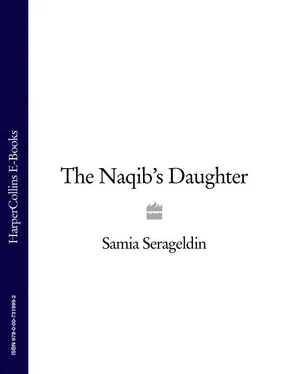Bonaparte seemed aware of the compliment the shaykh paid him by bringing a member of his family out of the seclusion of the harem to greet him, and showed his pleasure accordingly. ‘What a sweet child! And I am delighted to hear she is receiving an education with Shaykh Jabarti. You are the rare enlightened man among your peers, my good Bakri, and must set a fine example, particularly when it comes to the emancipation of women. I congratulate myself on my choice of Naqib of the Prophet’s House.’
After that the confusion started. Shaykh Bakri said something to Venture du Paradis, the gist of which seemed to be that he would be honoured to have Bonaparte ally himself by marriage to the house of the Prophet, through his daughter Zeinab. He was referring, improbably as it seemed, to the bright-eyed little person who had just served them nectar and had by then returned, Nicolas presumed, to her mother.
There was some consternation among the French at table. Bonaparte protested: ‘I am sensible of the honour, my dear Bakri, very sensible, but I cannot consider it. To begin with, I am married!’
That argument, Nicolas thought, would carry no weight at all with the shaykh, who undoubtedly had more than one wife and any number of concubines, as Bonaparte must know.
‘Besides, your daughter is too young, surely?’ the commandant added.
The rather involved answer was that the girl was of marriageable age, according to her mother, but, if he wished, Bonaparte could contract the alliance now, take her into his household and only consummate the marriage when he felt the time was right, as custom allowed.
Shaykh Bakri’s expectant expression was beginning to take a grim turn, and conversation had died down at the tables all around. Magallon and Venture du Paradis wordlessly communicated their concern to the commandant. Bonaparte immediately grasped the full sensitivity of rejecting an offer of political alliance with his single most reliable collaborator in a hostile city, and, what was more, with the house of the Prophet among a people of a different faith.
‘In that case, my dear Bakri, in that case, why, it would be an honour, of course, to be allied to the house of the Prophet!’
A collective sigh of relief rose from the hall, like a hiss of steam escaping from a kettle. Everyone rose – the French bowed, the Egyptians followed suit. Nicolas headed for the door along with the other guests, attended by a host of serving boys sprinkling them with attar of roses and showering them with petals till they had crossed the courtyard and exited out of the double gates to the street.
‘What a remarkable evening!’ Nicolas exclaimed to Magallon as they erupted into the tepid night air. But no sooner had they taken a few steps towards headquarters than Bonaparte was waylaid by a grim General Dugua.
‘Bad news, Commandant. The Ottoman Sultan has just declared war on France, and declared it the duty of every Muslim to resist what he calls “the sudden and unjust attack” of the French in Egypt.’
Bonaparte took the setback in stride. ‘It was to be expected, sooner or later. We couldn’t maintain the fiction that we were in Egypt with the Grand Seigneur’s blessing for much longer. But we must be prepared to deal with the population on a hostile footing from now on; sedition must be avoided by any means necessary.’
‘It has started already, Commandant.’ Dugua handed Bonaparte a scrolled letter. ‘We have intercepted two couriers with a letter from Ibrahim Bey in Gaza addressed to the ulema – the very shaykhs we have just dined with.’
Bonaparte handed the scroll to Venture du Paradis, who scanned it and translated. ‘This is the gist of it: “Stay calm, take care of yourselves and the people. His Majesty the Sultan in Istanbul has dispatched troops to come to our aid. God willing, they will arrive soon.”’
The commandant nodded. ‘Have the two couriers beheaded, and announce that this is the punishment awaiting anyone who carries letters from the Mamlukes or to them. I mean to have five or six heads cut off in the streets of Cairo every day. So far we have dealt with them gently to counteract the terrifying reputation that preceded us. Today, on the contrary, we must take the proper tone with them to make these people obey; and for them, to obey is to fear.’
As he watched Bonaparte and the generals depart for headquarters, Nicolas could see that events had driven the incident at Shaykh Bakri’s out of the commandant’s mind entirely; whether it would have any consequences for the young girl in question, he knew too little of the culture to so much as hazard a guess.
SIX
‘We governed blindly a country unfamiliar to us in its customs and language.’
G. Rigault, Le Général Abdullah Menou et la dernière phase de l’expédition d’Égypte
‘Sitt Zeinab, come speak to your father, he has asked for you.’
Normally Zeinab would have obeyed such a rare summons with alacrity, but she was glued with horror to the mashrabiyya window that overlooked the street. The cortège of the new police chief wound its way along the street in the direction of French headquarters, carrying something on the ends of pikes. As they approached she was able to make it out: human heads. She spun away from the window and hid her eyes in her shawl.
‘Sitt Zeinab, did you not hear me?’ the nurse repeated, arms akimbo. ‘Shaykh Bakri himself is asking for you!’
‘Dada, I can’t bear to look! Who are they?’
‘Who are who?’ The nurse came to the window. ‘What are you watching? Oh, it is that God-forsaken Fart Rumman. God preserve us! Those poor heads! Why are you watching these horrors?’
Zeinab brought her head out from under her shawl but kept her back to the window. ‘Were they spies for the Mamlukes, Dada? Or Bedouin raiders?’
‘They don’t look like any Bedouin I’ve ever seen; nor Mamlukes either, they don’t have moustaches. They’re poor fellahin, most like. Whenever Fart Rumman is sent out on patrol to catch spies and marauders, he rounds up anyone he can find and beheads them and brings the heads back to please his French masters, and they are none the wiser. Come down now or your father will have my head if you keep him waiting.’
Zeinab found her father sitting on the bench in the inner courtyard, his hookah bubbling beside him, quill in hand, drafting a document. Her mother, reclining alongside, brought a finger to her lips in warning to Zeinab. ‘It’s a very important letter that the French have entrusted your father to write on behalf of the diwan and all the ulema of Cairo,’ she whispered. ‘It will be addressed to the Sultan in Istanbul himself, and the Sharif of Mecca! Many copies will be made of it and it will be posted all over the city.’
Zeinab tiptoed to her father and peeked over his shoulder. The French are the friends of the Ottoman Sultan and the enemies of his enemies. Coinage and Friday prayers are in his name and the rites of Islam are kept as they should be . She had time to read no more before her father leaned forward to write and the wide sleeve of his kaftan obscured her view. When he straightened up again, she read: They are Muslims respecting the Koran and the Prophet, and they have provided for the celebration of the Prophet’s birthday with such worthiness and splendour as would bring joy to believers .
Shaykh Bakri leaned back, shaking his head. ‘The French think words are enough to dampen down sedition … but I can feel it running through the streets like the precursor to the plague.’
‘I am sure your wording is inspired, Shaykh Khalil,’ his wife soothed him.
Читать дальше












